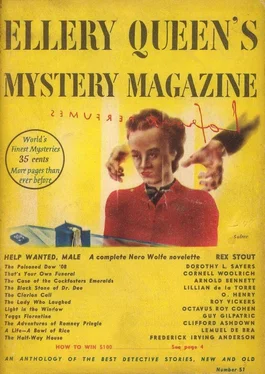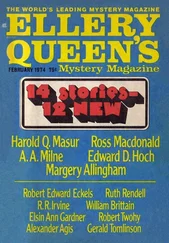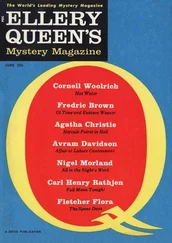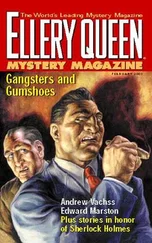Frederick Anderson - Ellery Queen's Mystery Magazine, Vol. 11, No. 51, February 1948
Здесь есть возможность читать онлайн «Frederick Anderson - Ellery Queen's Mystery Magazine, Vol. 11, No. 51, February 1948» весь текст электронной книги совершенно бесплатно (целиком полную версию без сокращений). В некоторых случаях можно слушать аудио, скачать через торрент в формате fb2 и присутствует краткое содержание. Город: New York, Год выпуска: 1948, Издательство: The American Mercury, Жанр: Классический детектив, на английском языке. Описание произведения, (предисловие) а так же отзывы посетителей доступны на портале библиотеки ЛибКат.
- Название:Ellery Queen's Mystery Magazine, Vol. 11, No. 51, February 1948
- Автор:
- Издательство:The American Mercury
- Жанр:
- Год:1948
- Город:New York
- ISBN:нет данных
- Рейтинг книги:3 / 5. Голосов: 1
-
Избранное:Добавить в избранное
- Отзывы:
-
Ваша оценка:
- 60
- 1
- 2
- 3
- 4
- 5
Ellery Queen's Mystery Magazine, Vol. 11, No. 51, February 1948: краткое содержание, описание и аннотация
Предлагаем к чтению аннотацию, описание, краткое содержание или предисловие (зависит от того, что написал сам автор книги «Ellery Queen's Mystery Magazine, Vol. 11, No. 51, February 1948»). Если вы не нашли необходимую информацию о книге — напишите в комментариях, мы постараемся отыскать её.
Ellery Queen's Mystery Magazine, Vol. 11, No. 51, February 1948 — читать онлайн бесплатно полную книгу (весь текст) целиком
Ниже представлен текст книги, разбитый по страницам. Система сохранения места последней прочитанной страницы, позволяет с удобством читать онлайн бесплатно книгу «Ellery Queen's Mystery Magazine, Vol. 11, No. 51, February 1948», без необходимости каждый раз заново искать на чём Вы остановились. Поставьте закладку, и сможете в любой момент перейти на страницу, на которой закончили чтение.
Интервал:
Закладка:
“You ask if I think it possible. Theoretically, anything is possible. I think it very grossly improbable. There were at least six men rolling. If she fell flat on the carpet, the faces of at least three of them would have been within a few feet of her. They must have seen her.”
“Then she must have been inside the first coil or two of the carpet when the men started to roll it?”
“Obviously!” agreed Spengrave.
“The doctor is already able to say that there are no signs of violence on the body. No one knocked her out and partly rolled her in the carpet. Therefore — a hostess suddenly slips away from her guests, rolls herself in the carpet — so that her guests may unconsciously assist her to commit suicide?”
Spengrave looked tired and indifferent, as if all this were none of his business.
“She was not happy with me, as I hinted to you yesterday. But she was not melancholic. The last person to think of suicide.”
Spengrave, thought the Chief, was no humbug. He was not pretending to be grid-stricken. But he was being very wooden, showed no desire to help.
“Against the theory of her having rolled herself up,” continued the Chief, “is the fact that she had had some stage experience under yourself. She was familiar with that carpet, knew how heavy it was, must have known she was doing a very dangerous thing.”
Spengrave snapped his fingers excitedly.
“That’s a glimmer in the dark!” he exclaimed. “She was familiar with that carpet, you said. Hold that thought, while I add something. That carpel was rolled up the wrong way — namely from right to left, standing with your back to the river. I noticed it, but did not want to ask the guests to unroll it and start again. Now are you guessing what I’ve guessed?”
This was what the Chief had been waiting for.
“She assumed it would be rolled up from the other end,” said the Chief, “and that therefore she would be unrolled.” As Spengrave nodded encouragingly: “But why — when there was no need to be there at all?”
“To give her guests a laugh — and to guy my lecture. She had,” he added, “the mind of a child;”
Thus Spengrave, for all his subtlety, had suggested a cause of death other than murder — always an unwise course when there is any chance of murder being suspected.
At the inquest Spengrave gave substantially the same answers as he had given to the Chief. The Chief Constable did not waste time studying him while he was giving evidence. Actors never betray themselves with involuntary movements of body, hands, or face. The jury returned a verdict of death by misadventure. The Chief, without any publicity, consulted Scotland Yard.
Chief Inspector Karslake was very dubious.
“If it’s murder at all, where is the overt act?” he asked. “The guests did the actual killing. And Spengrave didn’t even incite them to it.”
“If you were to induce a drunkard to lie down on a railway track and then watched him being killed, I could hang you, Mr. Karslake, without proving that you had incited the engine driver,” said the Chief Constable.
“But the lady wasn’t drunk,” objected Karslake. “And Spengrave didn’t—”
“Yes, he did. Look here!” The Chief spread out a chart of the garden, with all distances noted in feet and inches. “The woman was last seen at six thirty-five, when Spengrave finished his demonstration with the carpet. Between six forty and about six forty-seven, the guests were all — here — their eyes glued to Spengrave, who was lecturing about the double-headed dog.” He carried his pencil upwards and to the right. “Spengrave alone can see the carpet — he has a clear view. He would have seen his wife — must have seen her — go to that carpet.”
“You’ve certainly got something there,” admitted Karslake.
“Spengrave told them he doubted whether he had enough room on the lower lawn for the tray-and-goblet business. One of the men — Periss — asked him if they should roll up the carpet at once and take it back to the gym. Spengrave said, ‘Yes, please.’ That’s incitement.” The Chief went on: “As Spengrave is standing pat, it won’t matter if he knows we’re on his track. He thinks that, whatever we suspect, we can’t get any evidence.”
“So do I!” said Karslake gloomily. “But we’ll try.”
Karslake tried so hard that he came within an ace of committing homicide himself. He had his junior rolled in Spengrave’s carpet, observed that at the fourth coiling the weight of the carpet bore down the fringes so that air was excluded. The unfortunate junior had observed the same phenomenon some minutes before Karslake.
“That Chief Constable was simply passing the buck!” said Karslake after a month of fruitless investigation. “How can we prove that Spengrave induced her to get into the carpet, and that he wasn’t looking at his notes or something when she did it? I’m sick of the sight of those dossiers. Shove ’em along to the Department of Dead Ends and forget ’em!”
Spengrave sold his house by the river, warehoused his expensive furniture, and resumed residence in the suite at the top of the theatre. The act of the girl in the carpet was never put on.
The Department of Dead Ends, by its nature, could not function until a new light was thrown on a case by some tangential occurrence, some chance echo, even if it were only a chance remark. When this happened and a prosecution followed, Chief Inspector Karslake always called it Detective Inspector Rason’s “luck.”
“I’ve got a niece too,” protested Karslake. “And I hope I’m at least as good an uncle as you are. But my niece has never yet happened to babble out the dope on a case that’s been dead meat for over a year. So I will say it’s luck.”
This, in a police car shortly before mid-day in October 1937 — some fourteen months after the death of June Spengrave. They labored the matter of Rason’s niece because they were both secretly ill at ease. For they were on their way to Spengrave’s theatre, to ask him some questions they were confident he could not answer — which is a strange state of mind for a detective. But Spengrave was a distinguished man, whom nearly everybody could not help liking.
“She didn’t give me any dope — she gave me backchat,” retorted Rason. “I told her she didn’t need a new frock because she had a lovely one already. And she said if she went to a garden party in August in her corduroy velvet, people would be laughing over it when she was an old woman. I happened to remember the words ‘corduroy velvet’ in the dossier — and a garden party tool I’ve put in more than two months’ work on that bit o’ corduroy velvet, and you call it luck — sir!”
“You don’t have to ‘sir’ me till we get back,” chuckled Karslake. “This is your case, my boy, and welcome!”
The car stopped at the theatre. Rason thrust his card through the window of the box office. In due course an attendant presented himself.
“Mr. Spengrave is sorry he will have to keep you waiting for a few minutes. Will you follow me, please?” They were led through unsuspected corridors to the back of the stage and thence, up a single flight of stairs, to Spengrave’s dressing-room. It was a very large room with more than the usual number of mirrors. Above the mirrors was a frieze, depicting the Clown throughout the ages. In one wide corner was a writing table. There were two divans. The detectives took one each.
“Haven’t had much to do with the stage!” remarked Karslake. “What’s the good of putting all those telephones over the wash basin? — to say nothing of there being a bath-room behind this curtain.”
“They use the dressing-room as an office and a parlor as well,” Rason’s eye traveled along the frieze, to the court jester, to the hunchback pelted by the mediaeval audience, to the buffoon-god of Greek comedy, to the Sacaea of ancient Babylon where the King of the Revels, still wearing his mock crown, is sacrificed to the goddess Ishtar.
Читать дальшеИнтервал:
Закладка:
Похожие книги на «Ellery Queen's Mystery Magazine, Vol. 11, No. 51, February 1948»
Представляем Вашему вниманию похожие книги на «Ellery Queen's Mystery Magazine, Vol. 11, No. 51, February 1948» списком для выбора. Мы отобрали схожую по названию и смыслу литературу в надежде предоставить читателям больше вариантов отыскать новые, интересные, ещё непрочитанные произведения.
Обсуждение, отзывы о книге «Ellery Queen's Mystery Magazine, Vol. 11, No. 51, February 1948» и просто собственные мнения читателей. Оставьте ваши комментарии, напишите, что Вы думаете о произведении, его смысле или главных героях. Укажите что конкретно понравилось, а что нет, и почему Вы так считаете.












